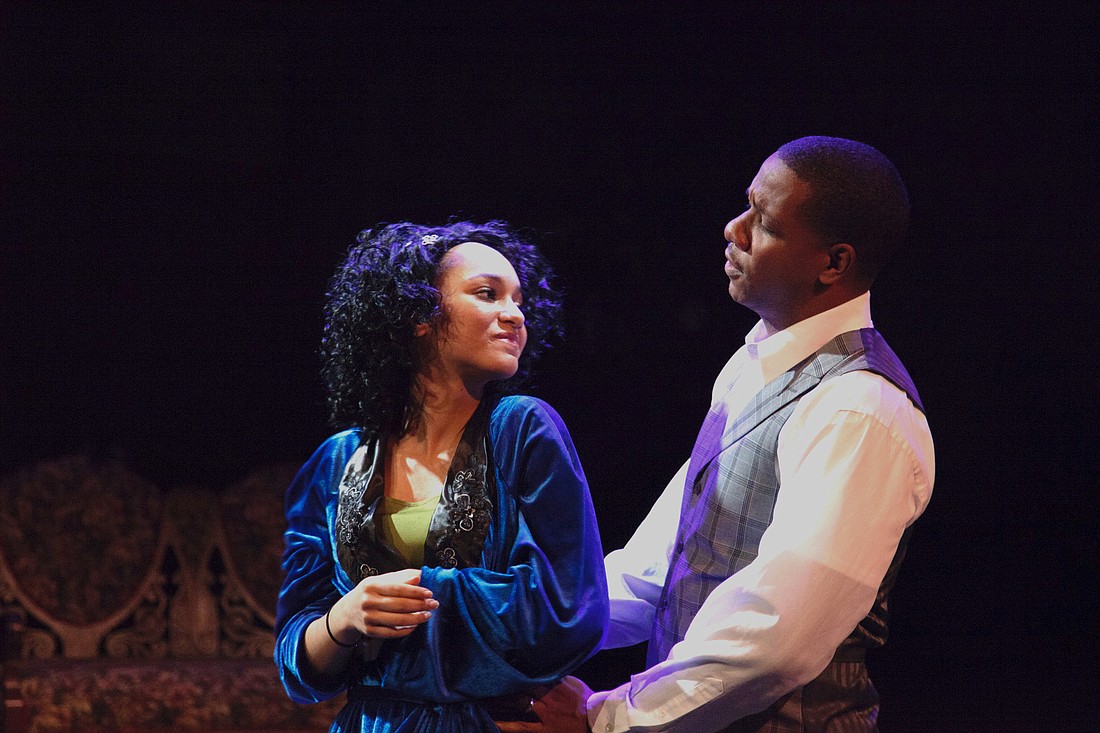- April 19, 2024
-
-
Loading

Loading

W.E.B. Du Bois was a giant of the Harlem Renaissance and the early Civil Rights era. But even giants have children and make all-too-human decisions about their welfare. Charles Smith’s “Knock Me a Kiss” — the current Westcoast Black Theatre Troupe production — considers the gigantic damage Du Bois did to his only daughter, Yolande.
What went wrong? The historical facts are up for grabs. In Smith’s imaginative retelling, it’s all quite clear. In the Harlem of 1928, the vivacious, slightly spoiled Yolande (Emerald Rose Sullivan) has a thing for bandleader Jimmie Lunceford (Joel Patrick King). It’s strictly platonic and that’s strictly her idea. Her father, Du Bois (E-Mani Cadet), thinks that’s a bad idea. Their family is African American royalty — setting a national example by their intellectual and strictly genteel ways. Marrying his daughter to a coarse, jazz musician simply won’t do. So, Du Bois pushes Yolande in the direction of the courtly Countee Cullen (Ethan Henry), the Harlem poet laureate and latter-day disciple of John Keats. Their resulting wedding ceremony rivals the Prince Charles/Lady Di shindig and has equally disappointing results. Countee wants to keep the marriage platonic, though he feels differently about his friend Harold Jackman, “the handsomest man in Harlem.” Countee and Yolande divorce in 1930. Yolande realizes the jazzman was her one true love. She goes back to him, but that ship has sailed.
Director Chuck Smith navigates this intimate narrative with a keen sense of big-picture history. Du Bois and Yolande’s bad choices reflect the era’s ugly racial politics. For Du Bois, the political trumps the personal — and he sacrifices his daughter on the altar of appearance. You laugh at the folly, cry at the pain.
One-note plays are easy. But this story turns on a dime from hilarious to heartbreaking. It ain’t easy, but the talented actors give it everything they’ve got.
Cadet’s Du Bois is suitably patriarchal. He plays his role with stature, though the script makes Du Bois the bad guy — a domineering, pompous bully. (Did the real Du Bois actually call his wife and daughter “wife” and “daughter” … ?) Henry’s epicene poet is definitely not the bad guy. As a gay African American in the 1920s, Countee is a member of two persecuted groups. He’s just the wrong man at the wrong time. Henry smartly conveys his quiet tragedy — and the failure of his brilliant rationalizations to sway the tide of the human heart. With his patois, charisma and dance moves, King fully sells you that he’s got the chops to be a Cotton Club superstar. Sullivan evokes Yolande’s unfolding inner life as she grows from naïve entitlement to the sorrowful wisdom of loss. Makeba Henry gradually reveals her own loss as Du Bois’ stroke-impaired wife, Nina. As Leonora, LaNisa Frederick provides a sassy reality check to Yolande’s high-flown, unrealistic ideals. Leonora speaks truth, but fails to talk sense into her.
Kudos to the talented actors and director. Kudos also to Cristy Owen (for period costumes worthy of “Boardwalk Empire”) and Steve Patmagrian (for an evocative set conveying an intellectual warrior’s devotion to his people). As to the playwright? Kudos, with quibbles.
Smith’s script oscillates between naturalistic dialogue and haunting spells of spoken-word poetry. It’s a long, strange trip, brilliantly written, but perhaps not entirely fair. His Du Bois verges on caricature. I’m not looking for praise of famous men — just don’t cut them out of cardboard.
As history, take this play with a grain of salt. As allegory, it works just fine. “When somebody asks for a sacrifice, always check the fine print,” being the moral of the tale. As Bogart once said, “The problems of three little people don’t amount to a hill of beans in this crazy world.” The crazy world comes first, kid. A lofty sentiment in 1942 "Casablanca."
In 1928 Harlem, it’s a bad idea.
IF YOU GO
“Knock Me a Kiss” runs through Feb. 8, at Westcoast Black Theatre Troupe, 1646 10th Way, Sarasota. Call 366-1505 or visit wbttroupe.org for more information.